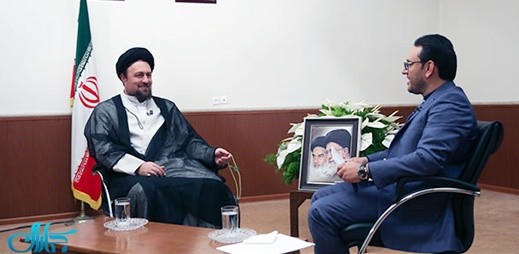PHOTO: Hassan Khomeini on State TV “Religion means all members of the society should be free to talk”
Seyed Hassan Khomeini, the grandson of the Islamic Republic’s founder Ayatollah Khomeini, has criticized Iran’s regime in an interview on State TV.
Iran’s conservatives have tried to restrict Khomeini, who is seen as an ally of President Rouhani and former President Hashemi Rafsanjani. The Guardian Council banned him in February for standing for the Assembly of Experts, the body which chooses the Supreme Leader, while State media limited his appearances.
However, on the eve of the 27th anniversary of his grandfather’s death, Khomeini was interviewed last week on the main channel of Islamic Republic of Iran Broadcasting. The discussion came a few days after Khomeini’s absence from opening session of the Assembly of Experts and his decision not to greet them at Ayatollah Khomeini’s mausoleum.
Khomeini opened the interview by teasing IRIB, whose hardline head was replaced earlier this month, “You finally decided to change your ways and invite me onto [TV after many years…As Rouhani says, I suddenly attacked you, and you backed off!”
Khomeini was careful to pay lip service to the Supreme Leader, “[He] is the deserving successor of Imam, and God Willing, he’ll continue to be our Leader.”
However, he aimed at the continued effort by hardliners and conservatives, battling Rouhani, to restrict Iran’s political and social space:
Religion is not just wearing hijab, saying prayers, and fasting. If you’re religious, you should respect people’s rights. Religion is the lack of poverty in the society; religion means all members of the society should be free to talk.
The criticism echoed the President’s declaration last year, challenging clerics, “One cannot take people to heaven through force and a whip.”
Khomeini also implicitly confronted the judiciary’s ban on any pictures or quotation of the reformist Mohammad Khatami, who was President from 1997 to 2005: “If we ban someone from talking or from being shown in the media, we are actually making ourselves look foolish.”
Then, in a swipe at unnamed conservatives, he declared, “Some people who didn’t play any role in the [1979 Islamic] Revolution showed up at the table just when the food was being served. Of course, the table of the Revolution belongs to everyone, but they should not occupy all the rooms.”
He concluded, “We cannot increase the prevalence of any idea in the country if the people don’t want it.”

